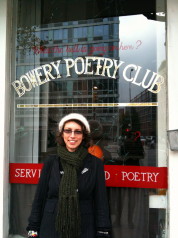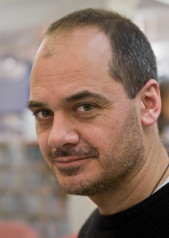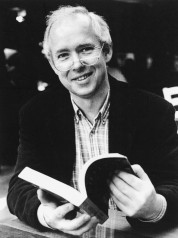
 Fulbright New Zealand celebrates National Poetry Day in New Zealand by sharing poems from some of the talented poets among our alumni: Bill Manhire, Hinemoana Baker, Ian Wedde, Glenn Colquhoun and Clare Jones.
Fulbright New Zealand celebrates National Poetry Day in New Zealand by sharing poems from some of the talented poets among our alumni: Bill Manhire, Hinemoana Baker, Ian Wedde, Glenn Colquhoun and Clare Jones.
These Fulbrighter poets are sharing their work today in honour of National Poetry Day.
The Fulbright programme has long supported poets. There are a number of Pulitzer prize winning poets among Fulbright alumni internationally including:
- Sylvia Plath (Fulbright Student to the United Kingdom, 1955);
- Robert P. Tristram Coffin (Fulbright Scholar to Greece, 1953);
- Peter Viereck (Fulbright Scholar to the United Kingdom, 1953);
- Theodore Roethke (Fulbright Scholar to Italy, 1955);
- James A. Wright (Fulbright Student to Austria, 1952);
- Richard Howard (Fulbright Student to France, 1958);
- John Ashbery (Fulbright Student to France, 1955);
- Galway Kinnell (Fulbright Scholar to France, 1955, and to Iran, 1959);
- Rita Dove (Fulbright Student to Germany, 1974);
- Charles Simic (Fulbright Scholar to Yugoslavia, 1982);
- Mark Strand (Fulbright Student to Italy, 1960, and Fulbright Scholar to Brazil, 1965);
- Philip Schultz (Fulbright Scholar to Israel, 1983); and
- Robert Haas (Fulbright Scholar to the United Kingdom, 1976).
Bill Manhire
New Zealand’s inaugural poet laureate Bill Manhire had a 1999 Fulbright New Zealand Award to be Fulbright Visiting Professor in New Zealand Studies at Georgetown University’s Center for Australian and New Zealand Studies in Washington, DC.
My World War I Poem
Inside each trench, the sound of prayer.
Inside each prayer, the sound of digging.
Hinemoana Baker
 Hinemoana Baker is a poet, writer, musician and producer based in Wellington. She received a 2010 Fulbright New Zealand Travel Award to present her work at the Jazz Poetry Concert in Pittsburgh and Shambaugh House at University of Iowa, and participate in other U.S. readings and performances.
Hinemoana Baker is a poet, writer, musician and producer based in Wellington. She received a 2010 Fulbright New Zealand Travel Award to present her work at the Jazz Poetry Concert in Pittsburgh and Shambaugh House at University of Iowa, and participate in other U.S. readings and performances.
Aspiration
The needle is a good size.
The fluid itself is mostly water
and some blood product
which accounts for its colour.
A higher level of testosterone
than you’d expect.
None of this is related
to breast milk, he tells me,
but rather more closely
to thermal sweat
given that the breast began
in the Phanerozoic era
as a sweat gland
four to six million
years ago.
It’s a modified sweat gland
my breast – all breasts.
And all mammals have five toes
even those who have grown
flippers or hooves
to disguise them.
The difference between
fibre and fire, after all,
is just one letter
right there in the middle.
Ian Wedde
 Ian Wedde is the author of fourteen collections of poetry. In 2010 he was awarded an ONZM in the Queen’s Birthday Honours, and was the New Zealand Poet Laureate in 2010. He received a 2006 Fulbright New Zealand Travel Award to attend a conference in Boston, Massachusets.
Ian Wedde is the author of fourteen collections of poetry. In 2010 he was awarded an ONZM in the Queen’s Birthday Honours, and was the New Zealand Poet Laureate in 2010. He received a 2006 Fulbright New Zealand Travel Award to attend a conference in Boston, Massachusets.
From The Little Ache: A German Notebook
7
Ineradicable
I wake up with this word in my head
out of a dream
that’s already been eradicated
but by what agency
and did it even exist
and if it did exist
and has been eradicated
then why was it important
to leave the word ineradicable behind?
As a kind of taunt perhaps
to that which has been uprooted
Heinrich and Maria
but replanted in the thick space
between words and genes
and in me
somewhere
like a dream.
Glenn Colquhoun
 Glenn Colquhoun, a poet and physician based in Levin, received a Fulbright New Zealand Scholar Award in 2010 to research medical storytelling programmes at Columbia, Harvard and Pennsylvania State Universities.
Glenn Colquhoun, a poet and physician based in Levin, received a Fulbright New Zealand Scholar Award in 2010 to research medical storytelling programmes at Columbia, Harvard and Pennsylvania State Universities.
Doctor to patient
(on ornithology and the practice of medicine)
You have brought me a bird.
I have seen this before.
When you say,
‘I am sore,’
I see a bird.
When you say,
‘I cannot breathe,’
I see a bird.
When you say,
‘I lie awake,’
I see a bird.
You have brought me a bird.
There is a bird
in the room.
Should I stand on the table?
Should I stand on the chair?
It is singing.
Listen, it is singing.
It is there, in the corner of your eye.
It is there, on your shoulder.
Here, in the pit of your stomach.
Now, between your legs.
Inside your rattle-cage,
when I press
my ear to it,
I hear a bird.
Behind your knee,
in the creep-
dark shade,
hops a bird.
And in your sorrow-joy,
tip-winged and
unbearable,
hangs a bird.
Give me your hand.
Here, it is in your hand.
It is breathing.
Listen, it is breathing.
Should I dance?
I should dance my old man’s dance.
You have brought me a bird.
How can this be?
You have brought me a bird.
Clare Jones
Clare Jones has received a 2016 Fulbright US Graduate Student Award. She earned an M.F.A. in Poetry from the University of Iowa Writers’ Workshop and a Graduate Certificate in Book Arts from the University of Iowa Center for the Book in May 2014. Clare will be coming to New Zealand to investigate the potential of new creative writing publishing initiatives to bring Pacific area cultures and climate change activism to the attention of the global community and encourage collaboration between specialists within environmental conservation groups and the arts in New Zealand and Polynesia. She will also research and write a book of poetry, Neotype, that weaves together themes of botany, ornithology, and geology of that area.
One Day I Wrote Her Name Upon the And
A poem should be like a print
in the sand in that you make
the same one over and over
and it goes away over and over
but you keep making them anyway
in order to move (mountains:
there is a reason so many Lonely Heart ads say
“I like long walks on the beach”
even the cynics write that in their Lonely Heart ads
looking down their noses at the lines “Our love shall live,
and later life renew”) back to the you
though the person who’s walking behind
you will figure out where you were going
with this (naturally) see how odd
your gait was from the years of turning
your feet out because you were born feet first
or did ballet or walked in reverse or simply liked
to do impressions they’ll see how fast
you were slipping see where you stumbled
and the sea dragged away
where you used your hands
and the dune fell in
– Clare Jones


